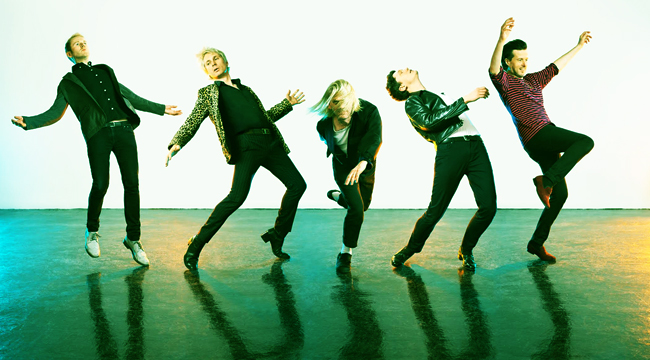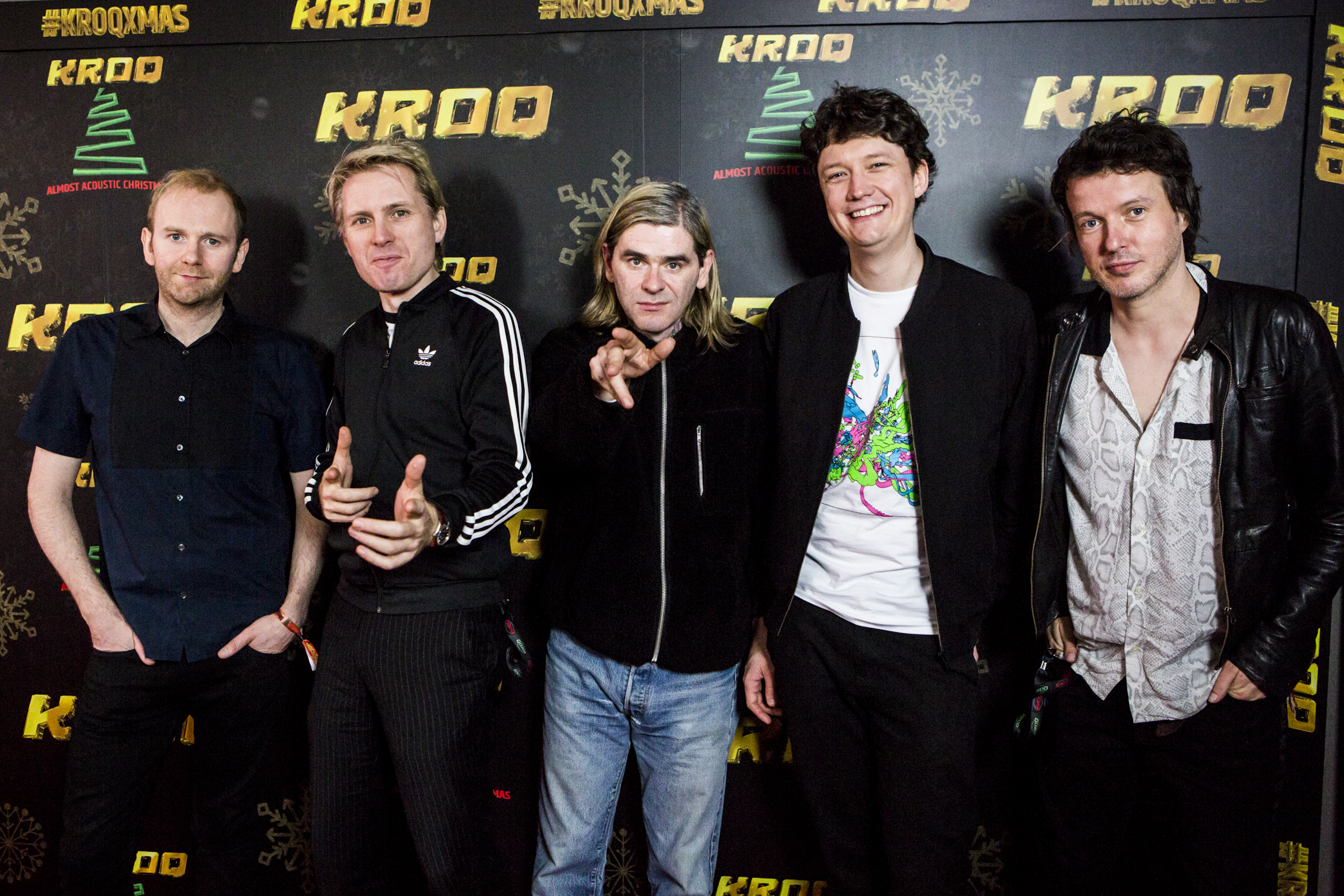
When Franz Ferdinand first appeared on the radar of music fans in 2004, they were a rare success on two fronts: Instantly embraced by the indie rock community and blasted out to the masses on alternative radio for their smash, “Take Me Out.” It wasn’t the slow and steady emergence expected in the rock world, it was a straight rocket launch, and one that signified a new found love affair between commercial outlets and the underground. While The Strokes, Jimmy Eat World, and The White Stripes preceded Franz Ferdinand, their ascendance signified a new era for alternative music, where bands Modest Mouse, The Killers, and Death Cab For Cutie could all find a home next to the particularly aggressive tunes that ruled the day.
Ascendence is the operative word here. With their latest effort, Always Ascending, the Scottish quintet refuses to get bogged down in the past or retread old ground. “Every artist, when you make a new piece of work, you’re always aiming to make the best thing you’ve ever made,” frontman Alex Kapranos says while speaking by phone during a press week in New York City. “Otherwise, what’s the point in starting to make it?”
On the album’s title track, Kapranos repeats the titular phrase until it becomes a sort of mantra or a statement of purpose for a band that’s on their fifth album. With five Grammy nominations, a Mercury Prize, and millions of albums sold, it might seem hard to keep an upward trajectory, but here the band continues to wade into uncomfortable waters and relish what they discover in those depths.
On their previous album, 2013’s Right Thoughts, Right Words, Right Action, it was working with the like of Todd Terje and Hot Chip to help push the band into new directions in dance sounds. On this latest endeavor, it’s collaborating with producer Philippe Zdar (Phoenix, Cut Copy) that helped create the exciting results of the new album.
Whether its the pulsing groove of the vibrant “Lazy Boy” or the club-ready buzz of “Feel The Love Go,” the band doesn’t forget their storied past when pushing forward. It’s generous music that doesn’t leave their fans behind. Or, as Kapranos puts it: “You want to acknowledge the things you’ve done in the past and surpass it, and take yourself to a place that you’ve never been before.” Recently, we talked briefly by phone about politics, making rock music you can dance to, and how Franz Ferdinand has changed as a band over the last fifteen years.
There’s also a distinct positivity that pops up on the record. On “Paper Cages,” you sing about stepping out of your cages, and on “Lois Lane,” you sing about making good choices to change the world. Positivity feels like something that has been lacking in music of late.
What’s interesting is a song like “Lois Lane,” there’s two lead characters in the song. The female protagonist is an optimist, a very positive character who believes journalists can change the world and generally has a more altruistic attitude. The other character believes that altruism is motivated by selfishness and that you only do it for the reward of feeling good about yourself. I hate to admit it, but there is definitely a cynical streak within me, but I think now, as you mention, is an age without much positivity, and I find myself drawn to a more positive outlook through contrariness and as a reaction to what we see around us.
Before you had your American election, we did that song “Demagogue” because we were terrified about what the results could be. And now that the result has actually happened, but also in the UK with Brexit and the loss of the Scottish referendum, you either react in angry protest or you react by searching for positivity elsewhere. Or, a positive alternative. And that’s something I see around me all the time. I see it in other artists, and also with the people that I know and hang out with. It’s sort of like ‘fuck what’s going on over there, I’m going to go over here and my alternative is going to be stronger.’ But yeah, it’s an odd age we are living in, and not one that I imagined I would live in, but here we go.

In terms of the Franz Ferdinand sound, you guys have always made rock music you can dance to. In 2018, that feels particularly relevant, where rock has largely turned away from an aggressive sound. How do you balance the two sensibilities to get something that finds the best of both worlds?
When we formed the band, we didn’t see ourselves as a rock band or a dance band, we were a band that played instruments and we wanted to make dance music but keep it raw. When I think of rock bands, I think of Black Sabbath or Nirvana or Deep Purple, but we were never quite a band like that. But again, we were never playing Chicago house, either. For this record, we really did want to make a dance album, right from the beginning. And I think we found a different way to do it.
To move forward as a band, you really have to search for the sound of the future. I hear that a lot about electronic music, and that’s what we’re searching for. But I’ve always loved the music of a raw band, and that’s something we really bonded with Philippe [Zdar], talking about how we would make sounds we’ve never heard before in the studio and then go back to old Violent Femmes records and B-52s records, and look at these albums that were exciting because the BPM jumps from 126 to 132 over ten bars. And that happens because you have four or five people playing together in a room. You can’t program that into the grid on a computer. You can’t sequence that.
And, when I was growing up, there were bands that melded rock music and dance music together, like The Happy Mondays or KLF, and the way they would do it is they would program and sequence and then play along to the programmed tracks. I guess what we’ve tried to do is the exact opposite of that, by taking the dynamics you’d find in dance and club music and play them as a band, and have nothing on the grid, so you’ve got that raw glow.
You guys lived together during the creation of the album, which sounds like something that is more typical of a band just starting out. Was it hard to get this group of grown men to leave their lives and hunker down like that?
Fortunately, even though we’re grown men, we’re still quite immature, so it was easy.
I’ve always been drawn to that idea of bands going away and excluding themselves from the world and create something. I love ideas of Dylan and The Band and The Big Pink, or Captain Beefheart going away to make Trout Mask Replica with the Magic Band. And, we’ve been doing it for a long time. Right at the beginning of the band, we took over an old warehouse to remove ourselves from the world and create our own universe, and take that universe back into the one that we all know and exist in our everyday lives. It’s a good way to do it and one that works for us. We weren’t saying goodbye to our lives completely, we still had relationships, Bob’s [Hardy] still got his dog. It wasn’t like we were in a cult, we didn’t cut off all contact to everybody else. But close.
What’s the biggest difference in the state of mind between the band that recorded this album and the band that recorded the debut 15 years ago?
When we formed the band in 2002, we were just having a laugh. You don’t really think about what the future is. You think about the future in extremely short terms. If we thought two months into the future, that felt a really long way away. I had no idea that these individuals would stay together and create something that had such longevity.
Having said that, I remember the first rehearsal we had, when Nick [McCarthy] was playing drums and Paul [Thomson] was playing guitar — they were both useless at both those instruments — I remember instantly thinking that there was something really special there. But I also know how volatile the personalities of people in bands tend to be, and I don’t deny that about myself. So, I still find it mildly amusing that we are still together. And how we, or any band, manage to do it is pretty astonishing.
I think in terms of our state of mind, we’re still motivated by the same things. The result is different now, though. I started writing songs when I was 14 and it was a moment of revelation, where I knew what I was meant to do. I found my purpose. And I guess, that’s all I’m doing. I’m one of the extremely fortunate people that have found their purpose and now I’m going to enjoy following it.
So, you start writing songs when you are 14 and you never imagine that you are going to write one song that takes on a life of its own and become deeply ingrained in the consciousness of music listeners. But, that’s what happened with “Take Me Out,” where people that don’t even know your band now know one of your songs. Do you ever feel like you are chasing that success?
I’ve never written any song to be a hit or that it had any particular status above any other song, and it’s true of that song. I remember when I was a kid and I first started going out and hanging out at clubs, you’d notice those songs. Things like “Love Will Tear Us Apart” by Joy Division or “Smells Like Teen Spirit” or “Stairway To Heaven” or “Paranoid” — these are all songs that people know even if they don’t know who Black Sabbath or Led Zeppelin are. So, I’m not complaining. It’s one of those good problems.
When you write a piece of music, you can’t dictate how people are going to respond to it. You can write something that has what you feel is depth and emotional integrity, but all that some people will get from it is catchy riffs, while others will appreciate all that you put into a song. So there might be people that only know that song and “Do You Want To” and “No You Girls,” and then there are some that know radio sessions that I’ve forgotten myself and know my work better than I do, and there is everyone in between. I’m not going to dictate to people how people listen to and respond to my music.
Always Ascending is out now on Domino Records. Get it here.






